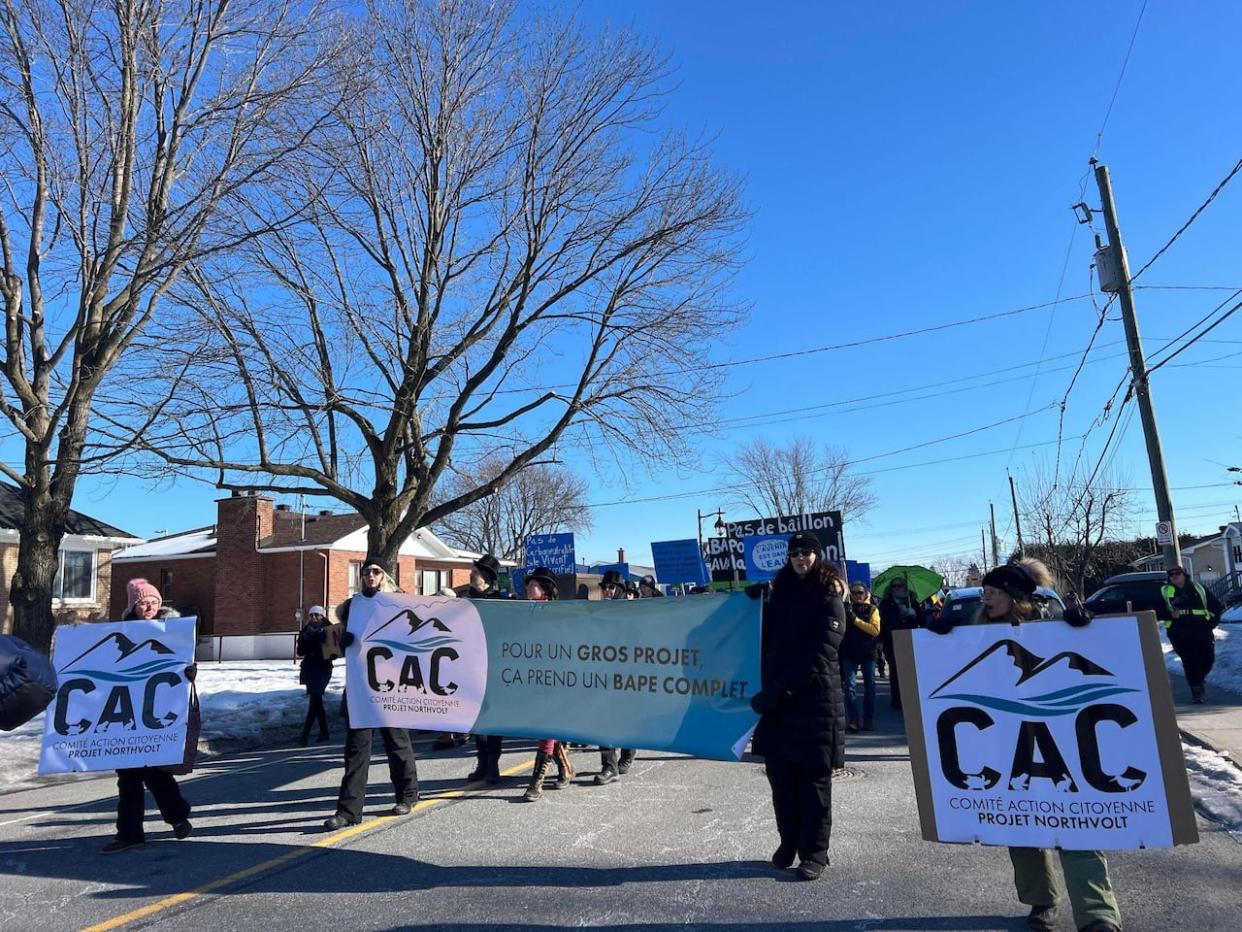Protesters in Montreal's South Shore march against Northvolt battery plant project

On Sunday, protesters marched through the streets of McMasterville, Que., on Montreal's South Shore, carrying banners and rattling noisemakers.
They showed up to oppose Quebec's plan to go through with the Northvolt EV battery plant without an independent environmental study.
Patrick Bonin, climate and energy campaigner at Greenpeace Canada, said the government is setting a bad precedent by ignoring calls for an independent environmental assessment and fast-tracking the project.
The government's recent raising of the Bureau d'audiences publique sur l'environnement (BAPE) evaluation threshold is "unacceptable," Bonin said, and a sign that Quebec is willing to bypass independent environmental studies, even amid a climate crisis.
In September, Premier François Legault said the project would not be subject to an evaluation by the BAPE as it didn't meet the threshold. However, that threshold changed only one year ago.
In February 2023, the threshold to trigger a review for cathode manufacturing increased from 50,000 to 60,000 tonnes. The Northvolt plant's production capacity would be 56,000 tonnes.
The process, Bonin said, lacks transparency and also threatens to destroy thousands of trees and vast stretches of wetland, putting endangered species in the region at risk.
He also cited other concerns such as the amount of river water that would be used, the quantity of electricity that would be needed, and the impact on traffic the new plant would create.
"We need to make sure that if they go forward with this project that we avoid all the impact," Bonin said. "And at the moment we don't have this information. They are bulldozing the site without providing the proper expertise and proper information for people."

Protesters voiced concern about the impact the plant might have on the region's wetlands. (Chloë Ranaldi/CBC)
'How can we be confident?'
Sylvie Cantin, was also among the protesters. As a member of Mères au front Rive-Sud, a group that brings together mothers and grandmothers to protect the environment on behalf of their children, she also wants answers.
"Right now the government is not responding to any of our questions," said Cantin. "So how can we be confident that this is good?
McMasterville resident Lucie Lamontange said that rules have been "pushed aside." She said she will continue to oppose the project until Quebec reverses course and conducts the BAPE study.
"They shouldn't have anything to hide from us if they're that green," she said. "All the wetlands around here are at stake."
The Conseil central de la Montérégie (CSN) union, which helped organize the demonstration, echoed a similar message.
"The land granted to Northvolt in Montérégie is one of the last wetlands in the region and an important refuge for heavily threatened biodiversity," the CSN said in a press release. "The rush to issue both national and local permits for the felling of 8,000 trees has done irreparable damage to the site and demonstrates political incoherence."
Public info sessions to come
Several weeks ago, lawyers with the environment group Centre québécois du droit de l'environnement (CQDE) urged a Quebec Superior Court judge to suspend construction, saying the city of Saint-Basile-le-Grand, Que., lacked the authority to greenlight the cutting of wetland trees to make way for the Northvolt plant.
In January, a Quebec Superior Court judge rejected CQDE's request for an injunction to stop work at the site.
The judge acknowledged the destructive nature of the plant's construction on wetlands but said the company had taken steps to make up for it, like investing $4.7-million to restore other wetlands and pledging to plant 24,000 new trees for the 8,730 living trees it would cut down and the 5,365 dead ones that would be removed.
Earlier in January, Northvolt said the plant site was sabotaged by an anonymous group after nails were driven into trees set to be cut down.
Quebec's Environment Ministry told CBC that the Northvolt plant is part of a shift to a greener approach in the province.
"What we're creating in Quebec with the battery industry is promising for our energy transition, for the economy and for our decarbonization objectives," a spokesperson for the ministry said in a statement.
Public consultations were held last fall, the ministry said, and public information sessions will be announced in the coming days.


